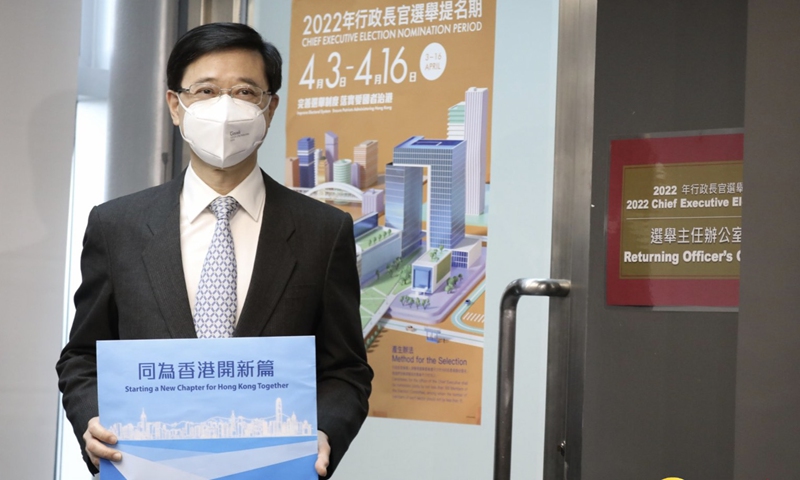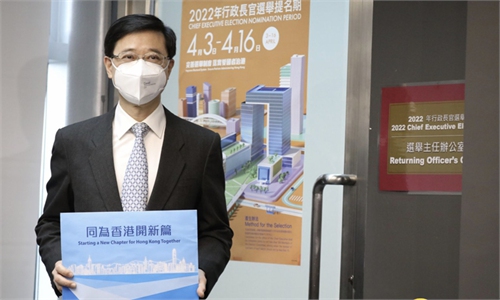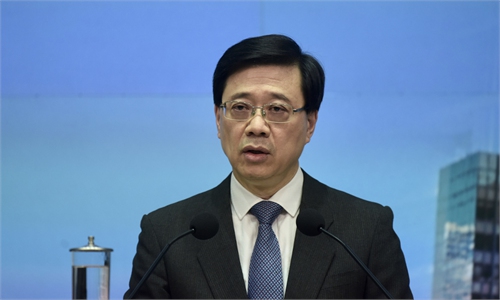HK Chief Executive candidate eyes border reopening with mainland as top work priority if elected

John Lee Ka-chiu formally submits his application for upcoming Chief Executive election in Hong Kong on Wednesday. Photo: Wen Wei Po
The Election Committee of the Hong Kong Special Administrative Region (HKSAR) announced on Monday the only validly nominated candidate - John Lee Ka-chiu - for the upcoming Chief Executive election, who told reporters that if he is elected, he will immediately launch the work aimed for border reopening with the Chinese mainland.
Lee met business representatives from five major chambers of commerce in Hong Kong -the Hong Kong General Chamber of Commerce, the Chinese General Chamber of Commerce, the Chinese Manufacturers' Association of Hong Kong, the Federation of Hong Kong Industries, and the Hong Kong Chinese Importers' and Exporters' Association - on Monday. Yuen Mo, chairperson of the Chinese General Chamber of Commerce, suggested that the candidate for the upcoming election should focus on the issue of border reopening with the mainland, according to media reports.
Although it's important for Hong Kong to resume connection with the outside world, it's more important to reopen borders with the mainland, as travelers from the mainland serve as the pillar for Hong Kong's economy, Yuen said.
Although there have been growing calls among the Hong Kong business community and ordinary residents for resuming the cross-border regular travel between the city and the mainland, which has been affected by COVID-19 for the past two years, it's not an easy task; the city shares the responsibility of containing the epidemic with the rest of the country, officials and experts said.
Hong Kong reported 747 new COVID-19 infections on Sunday, which was the third consecutive day that the city recorded new infections below 1,000. The fifth wave has so far caused 1.19 million cases, local news outlet Wen Wei Po said.
The reopening of the borders between the city and the mainland was delayed by the epidemic resurgence, as the central government had arranged for the reopening in January by gradually resuming normal travel but the plan was halted by the latest outbreak.
"Due to the epidemic, local businessmen face tremendous difficulties, they're hoping the future government will help solve those problems," Tam Yiu-chung, a member of China's National People's Congress Standing Committee from the Hong Kong region who also serves as director of Lee's campaign office, told the Global Times on Monday.
To reopen the borders with the mainland, firstly, the city has to contain the epidemic outbreak and carry on the dynamic zero-case strategy, Tam said, noting that it doesn't necessarily mean that all the infections have to be cleared but to curb the virus spread in a dynamic manner.
The Global Times learned from local officials in early 2022 that the mainland and Hong Kong had reached an agreement to reopen the borders, and the plan was set for January 9 and 10, with conditions agreed by both sides. However, the fifth wave of epidemic in Hong Kong disrupted the plan, Tam noted.
"Also, we need to consider the epidemic situation in the mainland. If both sides contain the epidemic resurgence, there will be conditions for relaunching the plan," he said.
Lee wrote in a social media post on April 12 that he thinks reopening the borders with the mainland is the most important and Hong Kong's anti-epidemic strategy has to be connected with the mainland's. "If the city's strategy does not coordinate with the mainland's anti-epidemic policy, and it can't reopen the borders with the mainland, it will largely limit Hong Kong's development," he said.



